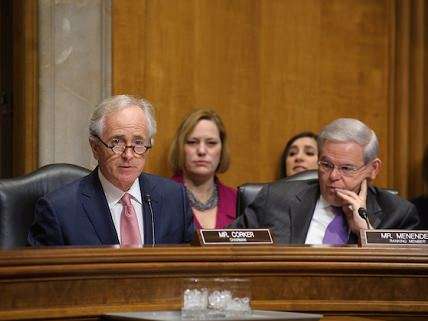Will Bipartisan Iran Legislation Make it Easier to Get a Deal With Iran Through?
President Obama will be able to veto Congressional rejection.


Yesterday the Senate Foreign Relations Committee passed legislation from Sen. Bob Corker (R-Tenn.), the committee chairman, that outlined how the president ought to transmit information to Congress about a deal with Iran if one is struck by the late June deadline, and how Congress can approve or reject it—by passing a joint resolution to that effect within 30 days of being informed of a deal. If Congress passes a resolution rejecting the deal, the president will be able to veto it.
The Wall Street Journal reports:
Under the agreement, Mr. Obama wouldn't be able to waive sanctions on Iran for 30 days while Congress initially reviewed a final agreement struck to diminish Iran's nuclear capabilities. Lawmakers would then be able to vote to approve or disapprove of the deal, or to take no action. If Congress passed a resolution rejecting the deal, Mr. Obama would have 12 days to veto the measure. If he vetoed it, Congress would have 10 days to try to override his veto, which requires a two-thirds majority.
The original bill, opposed by the White House, would have given Congress 60 days to review the deal.
Even if Congress were to approve the deal, it would have to vote separately to permanently lift congressional sanctions.
The shape of the deal follows broadly what I explained yesterday:
Importantly, it doesn't appear as if Corker's bill rests on the claim that the Senate has the Constitutional authority to provide or withhold advise and consent to international treaties, but creates its own legal mechanisms to allow Congress to approve or reject the deal. That's not completely surprising. Over the course of the last several decades, Congress has steadily ceded its authority on various foreign policy matters to the White House.
For those keeping track at home, when an international treaty goes through Congress, it is consented to or rejected by the Senate alone, not the entire Congress, and the president can't veto that. The White House hopes the structure of the legislation will limit the risk of an agreement being stopped by Congress.
Editor's Note: As of February 29, 2024, commenting privileges on reason.com posts are limited to Reason Plus subscribers. Past commenters are grandfathered in for a temporary period. Subscribe here to preserve your ability to comment. Your Reason Plus subscription also gives you an ad-free version of reason.com, along with full access to the digital edition and archives of Reason magazine. We request that comments be civil and on-topic. We do not moderate or assume any responsibility for comments, which are owned by the readers who post them. Comments do not represent the views of reason.com or Reason Foundation. We reserve the right to delete any comment and ban commenters for any reason at any time. Comments may only be edited within 5 minutes of posting. Report abuses.
Please to post comments


Is it Constitutional? Not that it matters, but I'm sort of a hanger-on.
It's a constitutional clusterfuck.
This is absurd. I don't care what they like to do, the Constitution is clear on this--the Senate ratifies or doesn't ratify. Treaties cannot have the force of federal law unless that ratification happens. Not legitimately, anyway.
Two-thirds majority in the Senate.
Clear as day.
Next!
We live in an America where special laws need to be passed just to enforce basic rights. The Constitution is like the Pirate's Code of governing anymore.
I'm sorry, but how far can we be from absolute tyranny if even basic rules aren't followed anymore?
I doubt we'll go full tyranny. Probably something closer to the Council of Ten.
It'll start with a constitutional facade, followed by the beatings and camps.